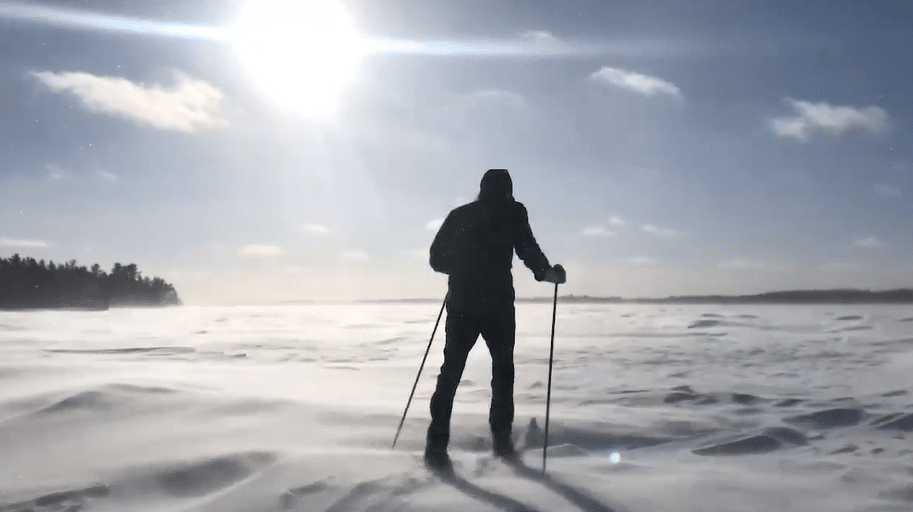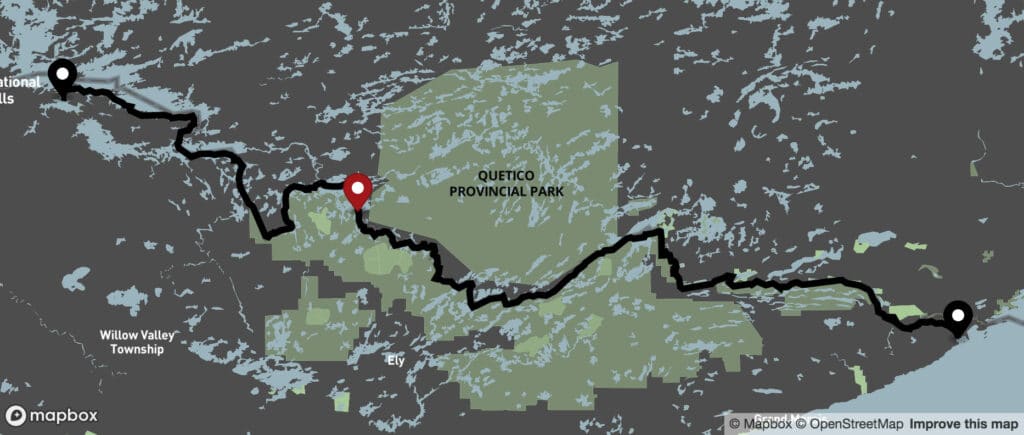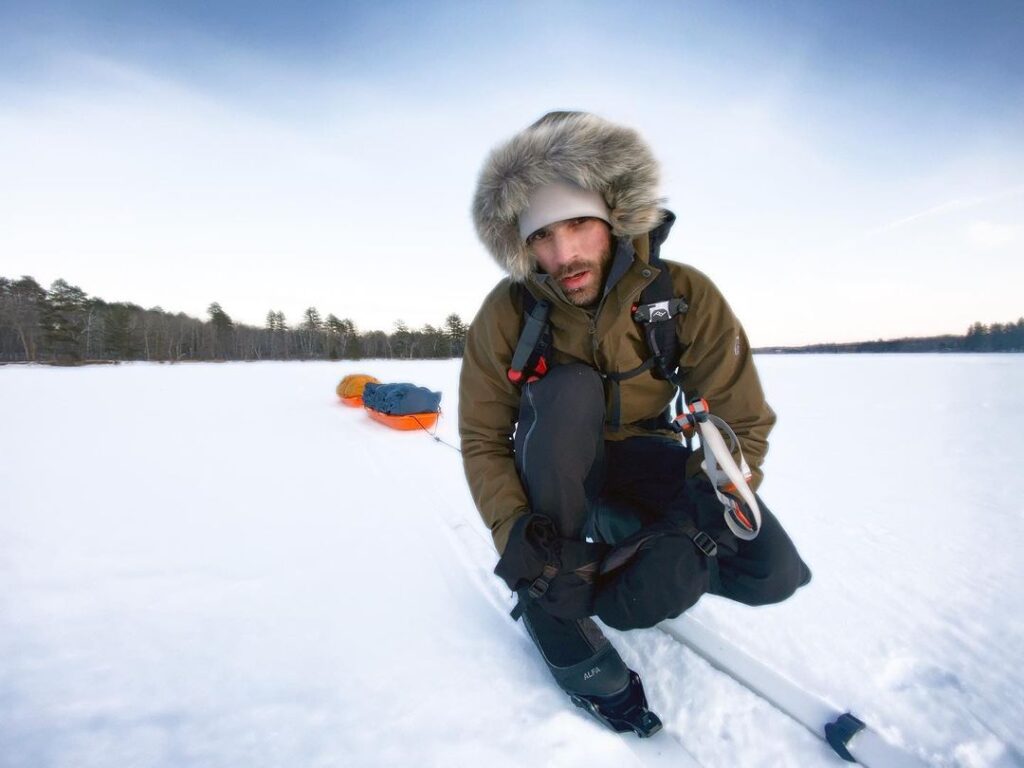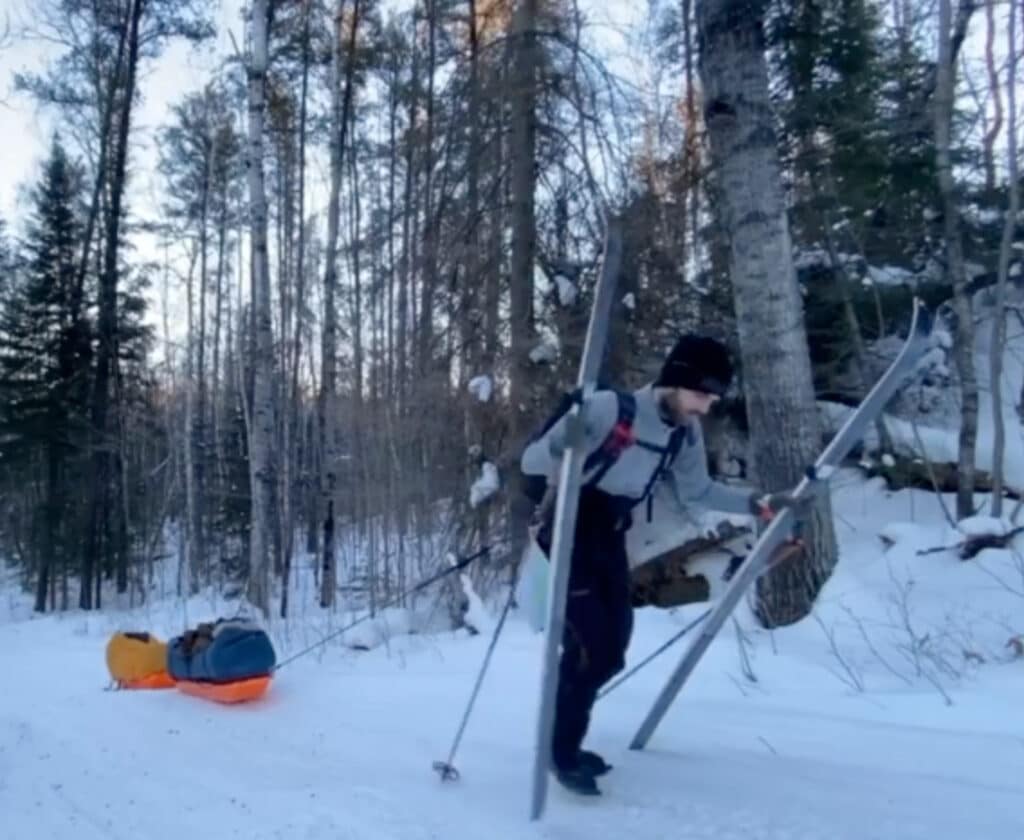
A northern Minnesota man is attempting a challenging winter expedition along the Border Route on Minnesota’s northern border. Ty Olson of Walker, MN is skiing from Rainy Lake in the west to Grand Portage in the east.
The Border Route is a storied chain of lakes and rivers that was traveled by Ojibwe people and fur traders. The large lakes allowed for efficient canoe travel, and connected Lake Superior to the heart of the lake country. Much of Northeastern MN and Boundary Waters region was ceded by Ojibwe people in an 1854 Treaty that paid them little, and sent them to resource-scarce reservations. Ty Olson is traversing the Border Route to raise funds and awareness for the Pine Ridge Reservation in South Dakota.
Olson set off two weeks ago from Voyageurs National Park. He hopes to reach Grand Portage by mid-March. He has already endured temperatures that dipped as low as -40 degrees at night. Wolves have been near constant companions, with their tracks evident during day, and howling at night.
As of Feb. 23, he had reached Loon Lake. The temperatures have also warmed up considerably, and he said it’s worse than when it was cold.
“I’m camped just north of Warrior Hill on Lac La Croix, but to get here was a slog,” he reported yesterday. “The snow is wet, heavy slush, and while I have the right wax to keep my skins from sticking, there’s still no glide. Imagine stomping through a melted marshmallow with two aberrant toddlers in tow that you are literally dragging, that’s skiing with sleds at +40°.”

The “Ski for Fire” expedition is raising funds to help residents of the Pine Ridge Indian Reservation stay warm. The campaign has already raised nearly $30,000 — far exceeding the initial $20,000 goal. “I’m skiing for firewood because people in Pine Ridge want it, need it, and ask for it. But they want more than that,” Olson told MPR News. “They want justice. I feel obligated to use my privilege to give voice to that.”
Donations are going to a nonprofit program called One Spirit, which provides employment and critical fuel for Lakota people. Many people on the reservation rely on wood for home heating. The organization hires Lakota workers, provides saws, log-splitters, warm clothing and safety equipment, and free firewood to families and Elders who need it.

Cold comfort
The extreme cold that Olson dealt with earlier on the trip also hit Pine Ridge, and One Spirit says the donations are helping it meet urgent needs. “Ty’s journey coincides with the deep freeze that has ripped through the United States, leaving elders and families on Pine Ridge Reservation in desperate need of heat,” the group said. “One Spirit is receiving a huge influx of requests for wood from our Firewood Program, and the money that Ty has already raised for this program is coming in when it’s needed most.”
Olson is trying to stay warm on the expedition with a high-calorie diet and a four-layer sleeping system that requires zipping five zippers.
So far, he has been traveling about eight miles each day, though he hopes to increase the pace as he consumes 2.5 pounds of food per day and lightens the pulk he is dragging behind him. The expedition is sponsored by Camp Chow, Stone Harbor Wilderness Supply in Grand Marais, and gear-maker Oware.
Skiing for justice
The trip isn’t just about raising money, though. Olson also hopes it will call attention to the ongoing harm caused to Native people by colonialism.
Olson grew up in the Red River Valley, a fifth-generation descendant of Norwegian settlers. He says he has come to understand how his ancestors obtained land from the federal government for farming, land where Lakota people had lived only a short time before. This expropriation can be connected to the ongoing poverty that many Native people experience today, as well as the loss of sovereignty and political power.
“My family built a prosperous new life in the Red River Valley, a region cradled between North Dakota and Minnesota, filled with the most fertile soil in the world,” he writes. “I grew up where my great-great-grandfather, Samuel Olson, homesteaded in 1877. It took us five generations to admit we live on stolen land.”
The adventurer says he now understands how his family’s success was linked to the oppression of indigenous people, and he’s trying to use his journey to advocate for justice.
More information:
- Ski for Fire
- One Spirit
- Skiing to keep other people warm: Man begins trek along Minn.’s northernmost border – MPR News


